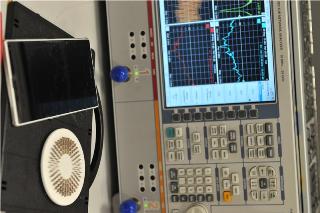Aug 21 2014
Researchers at the Universitat Politècnica de València (UPV) have designed a new device for wireless energy transfer that will, for example, charge mobile phones or laptops without needing cables.
 UPV
UPV
The system, patented by the UPV, is based on the use of resonators designed with radial photonic crystals; one of them would act as an energy transmitter and the other would be set on the device that needed to be charged. Between them a phenomena known as resonant coupling is produced, which is what finally produces the charging or recharging of the equipment.
“This phenomena is produced when a resonant object is moved closer to a second resonant element and both resonance frequencies are equal or quite similar. This physical proximity produces an energy coupling from the first device, that acts as the source, to the second one, that acts as the charge,” says José Sánchez-Dehesa, researcher at the Wave Phenomena Group of the Universitat Politècnica de València.
The device could also be used as a power supply system for equipment such as keyboards and wireless mice, speakers, etc. Besides consumer electronics, it could also be used in an industrial environment as power supply for robots or guided vehicles, and bioelectric devices (cardiac pacemakers, defibrillators, etc.)
The UPV researchers' study was released last June in the Annals of Physics magazine. After the first laboratory simulations and calculations of the system’s performance, the engineers of the Wave Phenomena Group are now working on the development of the first prototype.
Technology implementation
With regard to the implementation of these devices, UPV researchers say that, "although it may seem futuristic, it is foreseeable that they become universal due to the spread of charging infrastructure in many settings. This technology could follow the same path as WIFI networks," explains Jorge Carbonell, researcher at the Wave Phenomena Group.